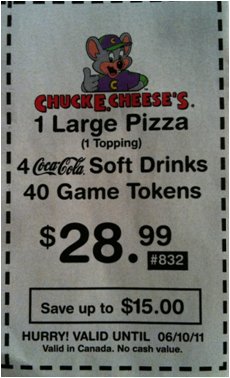When using social media, it’s important to be globally aware in your use of language. There are regional differences, dialects and local slang that can be interpreted in more than one way depending where you are. In particular, I encourage you to follow these 3 simple rules:
- Avoid idioms.
- Write out dates.
- Don’t use abbreviations.
Idioms are words and phrases that shouldn’t be taken literally. When used in everyday language (including blogs, status updates and tweets) they have an alternate meaning. Here are some examples:
- Nest Egg: Savings set aside for future use.
- Smell Something Fishy: Detecting that something isn’t right and there might be a reason for it.
- Keep your chin up: To remain joyful in a tough situation.
Using numbers for dates is an efficient way to communicate but only when the writer and the reader agree on the position of year, month and date.

What’s the expiry date on this Chuck E. Cheese’s coupon? It reads 06/10/11 but that could mean:
- June 10, 2011
- October 6, 2011
- October 11, 2006
- June 11, 2010
Abbreviations can also be a challenge. Of course, hashtags are a specific type of abbreviation on Twitter but I’m talking about commonly used abbreviations that might flow into everyday language. Things like SPCA (Society for the Prevention of Cruelty to Animals), GMT (Greenwich mean time), and NASA (National Aeronautics and Space Administration) are understood by many. But what about PMS – is that a Project Management System or something else?
While it’s important to make every character count when you’re limited to 140 in a tweet or 420 in a Facebook status update, be sure to pause and ask yourself if your message is clear.